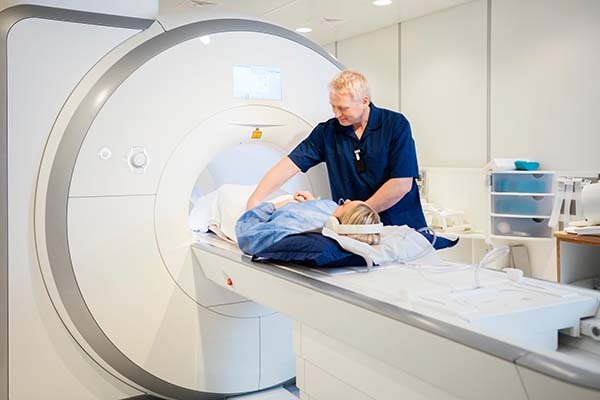Nuclear Medicine
Looking for a nuclear medicine scan? At the WELL Health Clinic Network, we provide quick and convenient access to the care you need. Our dedicated healthcare providers are committed to delivering exceptional care, assisting you every step of the way.

Nuclear Medicine Near You
Your Nuclear Medicine Questions Answered
What is a nuclear medicine scan?
Nuclear medicine is a specialized branch of radiology that uses a small amount of radioactive material, or radiopharmaceuticals, to examine organ function and structure. It can help diagnose and treat abnormalities very early in the progression of a disease, such as thyroid cancer.
When are nuclear medicine scans used and what are the common types of scans?
Nuclear imaging provides a way to visualize both the structure and function of organs and tissues. Because X-rays pass through soft tissue, such as intestines, muscles, and blood vessels, these tissues are difficult to visualize on a standard X-ray unless a contrast agent is used. Nuclear imaging enables visualization of organ and tissue structure as well as function.
The absorption of a radiopharmaceutical by an organ or tissue can indicate its level of function. In contrast, diagnostic X-rays primarily focus on anatomical studies.
Nuclear medicine scans help diagnose various medical conditions and diseases. Common tests include:
- Renal Scan: Evaluates kidney function and detects abnormalities or obstruction in renal blood flow.
- Thyroid Scan: Assesses thyroid function and helps evaluate thyroid nodules or masses.
- Bone Scan: Identifies degenerative changes, arthritis, bone diseases, tumours, and the causes of bone pain or inflammation.
- Gallium Scan: Diagnoses active infectious or inflammatory diseases, tumours, and abscesses.
- Heart Scan: Detects abnormal blood flow to the heart, measures heart function, and assesses damage after a heart attack.
- Breast Scan: Often used alongside mammograms to locate cancerous tissue in the breast.
- VQ Lung Scan: Examines airflow (ventilation) and blood flow (perfusion) in the lungs.
How should I prepare for my nuclear medicine scan?
Different types of nuclear medicine scans require different methods of preparation. Consult your healthcare professional for more details on how to prepare for your specific exam.
What can I expect during a nuclear medicine scan?
Depending on the scan type, you might need to remove your clothing and put on a gown. A technician or nurse will insert an intravenous line (IV) into your vein to administer the radiotracer. For some scans, the radiotracer will need several days to travel through your body, and this step will occur before your test date. You may experience minor sensations due to the insertion of the IV.
Once the radiotracer has accumulated in the testing area, the technologist will position a gamma camera in the examination area and capture a series of images. Please remain still, as movement can affect the scan. The duration of a nuclear medicine scan can vary greatly, ranging from several minutes to several days. In some cases, you may leave and return as necessary.
The technologist may ask you to wait while they check the images in case additional images are required. This doesn’t indicate any abnormalities in your testing but rather a need for better visualization.
Some tests may require you to exercise on a treadmill or stationary bicycle. If you cannot exercise, you may need to take medication that increases blood flow.
For more information about our nuclear medicine services in Ontario, visit myhealthcentre.ca
How do I find a nuclear medicine scan near me?
You can use the WELL Clinics website to find a Nuclear Medicine clinic near you. If you have a referral or requisition, select the button below to book an appointment.
If you don’t have a referral or requisition but would like to request a Nuclear Medicine appointment, book with your family doctor. Or, use our clinic map to find a primary care clinic or telehealth service and request a referral.





